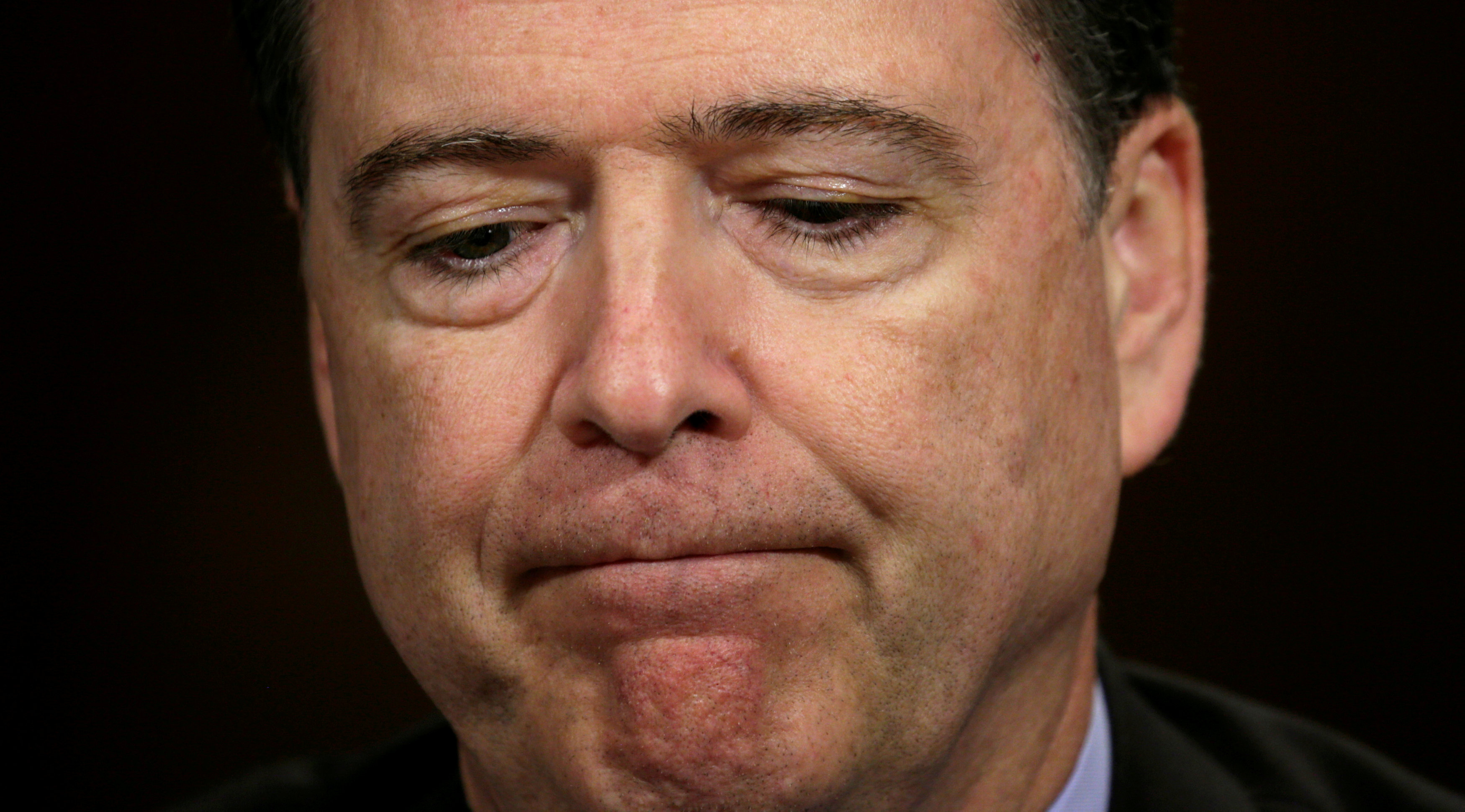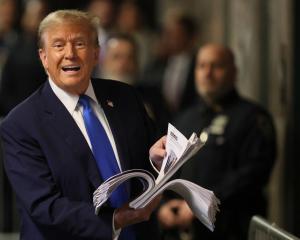
With the Republican president facing a storm of criticism from many Democrats and some lawmakers in his own party, the Trump administration accused Comey of "atrocities" on the job and denied his firing was related to the FBI investigation into the Trump 2016 presidential campaign's possible collusion with Moscow to sway the election.
The ouster stunned Washington and plunged Trump deeper into a controversy over his campaign's alleged ties with Russia that has dogged the early days of his presidency.
Democrats intensified accusations on Wednesday that Comey's removal was intended to undermine the FBI probe and demanded an independent investigation. Some of Trump's fellow Republicans called the action troubling.
In a farewell letter to staff seen by CNN, Comey, who was appointed by Trump's predecessor, Democratic President Barack Obama, said he had "long believed that a president can fire an FBI director for any reason, or for no reason at all." He added he would not spend time dwelling on Trump's decision "or the way it was executed."
Trump, who met Russia's foreign minister at the White House on Wednesday, defended his abrupt firing of Comey from a law-enforcement post he had held since 2013, saying he had not been doing a good job.
The president had been considering letting Comey go "since the day he was elected," Deputy White House Press Secretary Sarah Huckabee Sanders told a news briefing. She said he acted in part after Attorney General Jeff Sessions and deputy Attorney General Rod Rosenstein this week "outlined the basic, just, atrocities in circumventing the chain of command in the Department of Justice" that she said Comey had committed.
A congressional source with knowledge of the matter said Comey told lawmakers within the past few days that he had asked the Justice Department for more funding for the Russia probe. Comey informed lawmakers of that request after the Senate intelligence committee had asked the FBI to speed up its Russia inquiry, the source said.
Democrat Dianne Feinstein, the leading Democrat on the Senate Judiciary Committee, told reporters she understood that Comey was seeking more resources for the FBI investigation.
"We know that there are subpoenas being requested in the Eastern District of Virginia, and that this investigation has been going on," Feinstein told reporters.
She said she met with Comey on March 15 along with Republican Senator Chuck Grassley. At the time Comey said it was "a big counter-intelligence and criminal investigation," Feinstein said.
Responding to media reports that Comey had asked Rosenstein last week for a significant boost in resources for the agency's probe, Justice Department spokesman Ian Prior said in an email, "Totally false."
US intelligence agencies concluded in a January report that Russian President Vladimir Putin had ordered an effort to disrupt the 2016 election that included hacking into Democratic Party emails and leaking them, with the aim of helping Trump.
Russia has denied any such meddling. The Trump administration denies allegations of collusion with Russia.
'Lost the confidence'
The Trump administration said on Tuesday Comey's firing was over his handling of an election-year FBI probe into then-Democratic presidential nominee Hillary Clinton's use of a private email server during her time as secretary of state.
Many Democrats have criticized Comey's management of that investigation, but they sharply questioned the timing of his dismissal, given that Trump could have acted soon after taking office on Jan. 20 and that he has repeatedly criticized the FBI and congressional probes into Russia's role in the election.
Asked by reporters why he fired Comey, in the White House as he met with former Secretary of State Henry Kissinger in the Oval Office, Trump said, "He wasn't doing a good job, very simply."
In a flurry of Twitter posts earlier, Trump offered a further explanation, saying Comey had "lost the confidence of almost everyone in Washington, Republican and Democrat alike," and lambasted his critics.
Republicans control both chambers of Congress, and a growing number of Republicans also expressed doubts over Trump's move. However, Senate Majority Leader Mitch McConnell, a Republican, stood by Trump, accusing Democrats of "complaining about the removal of an FBI director who they themselves repeatedly and sharply criticized."
He also dismissed Democratic calls for the Justice Department to appoint a special prosecutor to look into Moscow's role in the election and possible ties between Trump associates and Russia. Speaking on the Senate floor, McConnell said a new investigation would "only serve to impede" existing probes such as one under way in the Senate intelligence committee.
The Senate's minority leader, Democrat Chuck Schumer, said Rosenstein should appoint a special prosecutor, and he also called on McConnell to hold closed and potentially classified briefings with all US senators to question the top Justice Department officials, Sessions and Rosenstein.
'Too close to home'
Schumer said such briefings should address why Sessions, who previously recused himself from involvement in the Russia investigation after misstating his own contacts in 2016 with Russia's ambassador to Washington, was able to influence the firing of the man conducting the FBI's Russia investigation.
"We know Director Comey was leading an investigation in(to) whether the Trump campaign colluded with the Russians, a serious offense. Were those investigations getting too close to home for the president?" Schumer said.
Some Democrats compared Trump's move to the "Saturday Night Massacre" of 1973, in which President Richard Nixon ordered the firing of an independent special prosecutor investigating the Watergate scandal that eventually led Nixon to resign.
As the controversy swirled, Trump met with Russian Foreign Minister Sergei Lavrov in the Oval Office on Wednesday. Afterward, Trump said the two had "a very, very good meeting" and discussed the need to stop the killing in Syria's lengthy civil war.
Their meeting was the highest-level public contact between Trump and Putin's government since Trump took office on Jan. 20.
Asked earlier by reporters at the US State Department before a meeting with Secretary of State Rex Tillerson if Comey's firing would cast a shadow over the talks, Lavrov responded in a sarcastic tone: "Was he fired? You're kidding. You're kidding."
The Kremlin said it hoped Comey's firing would not affect Moscow's ties with Washington, saying it believed his dismissal had nothing to do with Russia. Putin also said the ouster would not impact US-Russian relations.
Trump's nominee as the new director would need to win Senate confirmation. Trump's possible choices to head the FBI on an interim basis, according to a White House official, include: acting FBI Director Andrew McCabe; Assistant Director Paul Abbate; Chicago FBI agent Michael Anderson; and Richmond, Virginia agent Adam Lee.
US stocks wavered and Treasury yields were little changed on Wednesday as Comey's firing spurred some concern among investors that the fallout could hinder the president's economic agenda.












